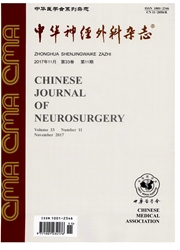

 中文摘要:
中文摘要:
目的研究亚低温对大鼠颅脑创伤(TBI)后β-分泌酶(BACE)的影响。方法应用液压冲击装置制作大鼠颅脑创伤模型,实验分为假手术组、创伤常温组(37℃)和创伤亚低温组(32℃),每组12只大鼠。采用免疫组织化学和免疫荧光法检测BACE表达部位,采用RT-PCR和免疫印迹法研究BACEmRNA和蛋白表达水平。结果与假手术组比较,创伤常温组大鼠脑组织BACE免疫阳性细胞数明显增多,BACEmRNA和蛋白表达上升(P<0.05)。但是,可以看出BACE在给予亚低温处理后的免疫阳性细胞数量以及蛋白水平显著低于常温处理组(P<0.05),与假手术组比较差异无统计学意义。结论亚低温可以通过降低颅脑创伤后BACE表达水平来减轻继发性脑损伤程度,起到神经保护作用。
 英文摘要:
英文摘要:
Objective To investigate the effects of mild hypothermia treatment on the expression of β -secretase (BACE) after traumatic brain injury (TBI) in rat model. Methods Adult male Sprague - Dawley rats were randomly divided into three groups : sham - operated group, TBI with normothermia group (37℃), and TBI with hypothermia group (32℃). The traumatic brain injury rat model was established with a fluid percussion device. Mild hypothermia intervention for 6 h immediately initiated after TBI in hypothermia group. At 24 h after TBI, rats were sacrificed and the brain hippocampus tissues were prepared for hematoxylin and eosin staining. The immunohistochemistry and immunofluorescence were used for the location of BACE. Gene transcription and protein expression of BACE were examined by reverse transcription -polymerase chain reaction (RT -PCR) and Western blotting, respectively. Results Normothermia group showed increased BACE higher than that of sham - operated group ( P 〈0. 05 ) . However, hypothemlia group showed significantly lower expression of BACE compared with normothermia group ( P〈0.05), which showed no significant difference compared to the sham - operated group. Conclusions Mild hypothermia treatment, which plays a neuroprotective role, might decrease the level of BACE induced by traumatic brain injury, resulting in secondary brain injury.
 同期刊论文项目
同期刊论文项目
 同项目期刊论文
同项目期刊论文
 期刊信息
期刊信息
